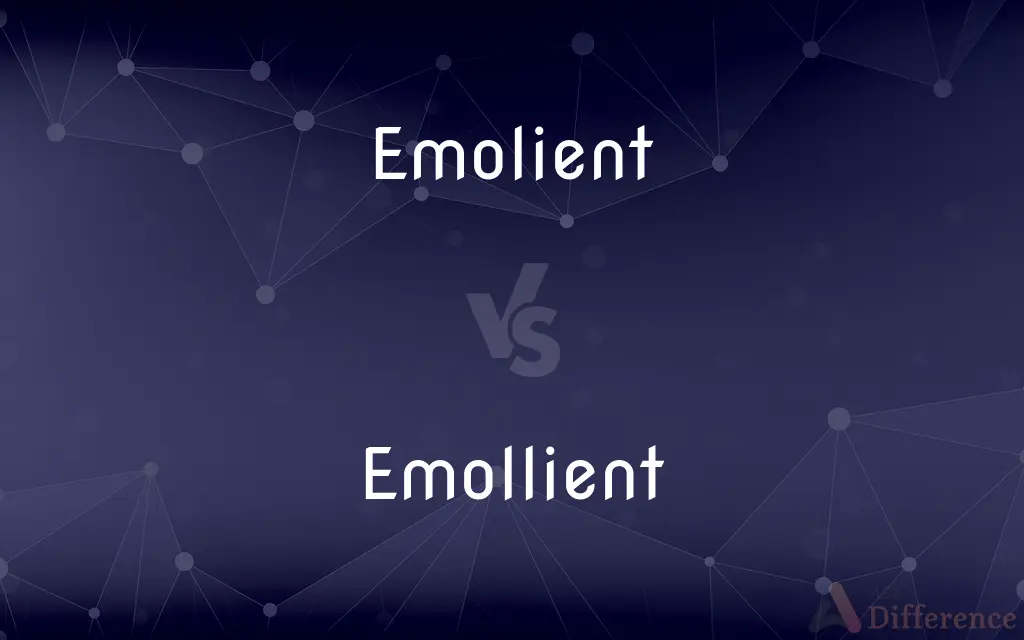Emolient vs. Emollient — Which is Correct Spelling?
By Tayyaba Rehman — Updated on April 2, 2024
"Emolient" is a misspelling. The correct spelling is "Emollient," a substance that softens or soothes the skin.

Table of Contents
Which is correct: Emolient or Emollient
How to spell Emollient?

Emolient
Incorrect Spelling

Emollient
Correct Spelling
ADVERTISEMENT
Key Differences
"Emollient" contains two 'l's, just as "softening" has two 'n's.
Recollect that "emollient" is "filling" for the skin, thus the double 'l'.
The word "oil," which is an emollient, has the same 'll' sound in the middle.
Think of "moist" for "emollient" and remember both have two repeated letters (ss and ll).
Consider "emollient" has an "emolli-ent" pattern, similar to "mollify."
ADVERTISEMENT
How Do You Spell Emollient Correctly?
Incorrect: This emolient is perfect for sensitive skin.
Correct: This emollient is perfect for sensitive skin.
Incorrect: Emolient creams are great for dry skin.
Correct: Emollient creams are great for dry skin.
Incorrect: He recommended an emolient to soothe the irritation.
Correct: He recommended an emollient to soothe the irritation.
Incorrect: The doctor prescribed an emolient for her eczema.
Correct: The doctor prescribed an emollient for her eczema.
Incorrect: Use this emolient lotion daily for best results.
Correct: Use this emollient lotion daily for best results.
Emollient Definitions
Emollient is a substance that moisturizes and softens the skin.
Many use shea butter as an emollient for dry skin.
Emollient can describe an agent that softens or relaxes body tissues.
The emollient properties of the balm help with chapped lips.
Emollient can refer to something having a soothing effect, especially on feelings.
His kind words were an emollient to her distress.
In medicine, an Emollient is a topical preparation used to protect the skin.
The doctor prescribed an emollient cream for eczema.
As an adjective, Emollient means having the quality of softening or soothing.
The emollient lotion gave instant relief.
Softening and soothing, especially to the skin.
Making less harsh or abrasive; mollifying
The emollient approach of a diplomatic mediator.
An agent that softens or soothes the skin.
An agent that assuages or mollifies.
Something which softens or lubricates the skin; moisturizer.
(figurative) Anything soothing the mind, or that makes something more acceptable.
Moisturizing.
(figurative) Soothing or mollifying.
Softening; making supple; acting as an emollient.
An external something or soothing application to allay irritation, soreness, etc.
Toiletry consisting of any of various substances resembling cream that have a soothing and moisturizing effect when applied to the skin
Having a softening or soothing effect especially to the skin
Emollient Meaning in a Sentence
Emollient balms can relieve chapped lips.
She uses an emollient moisturizer to prevent dry skin.
My dermatologist suggested an emollient for my dry hands.
Applying an emollient after showering helps retain moisture.
The nurse recommended an emollient to care for the wound.
Adding an emollient to your nightly routine can improve skin texture.
An emollient bath oil can soothe itchy skin.
Emollient ointments are thicker and more hydrating than lotions.
A good emollient will not contain irritants like alcohol.
In cold weather, an emollient can prevent skin from cracking.
Before bed, applying an emollient can help skin repair overnight.
He found an emollient cream that eased his psoriasis symptoms.
For dry scalp, an emollient shampoo can offer relief.
Emollient lip balms protect against the harsh winter air.
After swimming, apply an emollient to replenish your skin's moisture.
Teachers recommend students with dry skin use an emollient during school.
Emollient Idioms & Phrases
An emollient touch
A gentle and soothing manner or approach.
The nurse's emollient touch reassured the young patient.
To apply an emollient
To use a soothing substance to moisturize or heal the skin.
To combat dryness, she would apply an emollient every night.
Smooth as an emollient
Describes something extremely smooth or soothing.
After using the new skin cream, her face felt smooth as an emollient.
Emollient effect
The soothing and moisturizing impact on the skin.
The emollient effect of the lotion was immediate and lasting.
To seek emollient relief
To look for comfort and soothing from dryness or irritation.
After days in the sun, he sought emollient relief for his burnt skin.
An emollient remedy
A treatment that moisturizes and soothes.
For her eczema, the dermatologist prescribed an emollient remedy.
Emollient properties
The characteristics of a substance that make it moisturizing and soothing.
The plant extract is known for its emollient properties.
Emollient for the skin
Something that moisturizes and soothes the skin.
Aloe vera is a natural emollient for the skin.
Common Curiosities
What is the verb form of Emollient?
The related verb is "emolliate."
What is the pronunciation of Emollient?
It's pronounced as /ɪˈmɒl.i.ənt/.
What is the root word of Emollient?
The root word is Latin "emollire," meaning "to soften."
Which vowel is used before Emollient?
The article "an" is typically used before "emollient."
What is the singular form of Emollient?
The singular form is "emollient."
What is the plural form of Emollient?
The plural form is "emollients."
Which conjunction is used with Emollient?
Any conjunction can be used, like "and" or "or," depending on the sentence.
Why is it called Emollient?
It's derived from the Latin word "emollire," meaning to soften, referring to its softening properties.
Is Emollient an abstract noun?
No, "emollient" is a concrete noun when referring to a substance, but can be abstract when referring to soothing qualities.
Is Emollient a negative or positive word?
Neutral to positive, as it denotes softening and soothing qualities.
Is Emollient a countable noun?
Yes, you can have one emollient or multiple emollients.
Is the word Emollient imperative?
No, "emollient" is not an imperative form.
What part of speech is Emollient?
"Emollient" can be a noun or an adjective.
What is another term for Emollient?
Another term could be "moisturizer" or "softener."
Which preposition is used with Emollient?
Prepositions like "with" (as in "cream with emollient") are used.
Which article is used with Emollient?
Both "a" and "an" can be used, but "an" is more common due to the vowel sound at the beginning of "emollient."
Is Emollient a collective noun?
No, "emollient" is not a collective noun.
How many syllables are in Emollient?
There are four syllables in "emollient."
How do we divide Emollient into syllables?
It's divided as e-mol-li-ent.
Is Emollient a noun or adjective?
"Emollient" can be both a noun and an adjective.
Is the Emollient term a metaphor?
Not inherently, but it can be used metaphorically to describe soothing actions or words.
Is the word “Emollient” a Direct object or an Indirect object?
"Emollient" can serve as a direct object, depending on its use in a sentence.
What is the first form of Emollient?
As a noun, "emollient" doesn't have verb forms. If considering "emolliate" as a verb, then "emolliate" is the first form.
What is the second form of Emollient?
For the verb "emolliate," the second form doesn't commonly exist.
How is Emollient used in a sentence?
"To combat dryness, she applied an emollient cream to her hands nightly."
Is Emollient a vowel or consonant?
"Emollient" is a word made up of both vowels and consonants.
What is the opposite of Emollient?
The opposite could be "abrasive" or "irritant."
Is Emollient an adverb?
No, "emollient" is not an adverb.
Is the word Emollient a gerund?
No, "emollient" is not a gerund.
What is a stressed syllable in Emollient?
The second syllable "mol" is stressed.
Which determiner is used with Emollient?
Determiners like "this," "that," or "my" can be used.
What is the third form of Emollient?
For the verb "emolliate," the third form doesn't commonly exist.
Share Your Discovery

Previous Comparison
Optomist vs. Optimist
Next Comparison
Beggining vs. BeginningAuthor Spotlight
Written by
Tayyaba RehmanTayyaba Rehman is a distinguished writer, currently serving as a primary contributor to askdifference.com. As a researcher in semantics and etymology, Tayyaba's passion for the complexity of languages and their distinctions has found a perfect home on the platform. Tayyaba delves into the intricacies of language, distinguishing between commonly confused words and phrases, thereby providing clarity for readers worldwide.







































